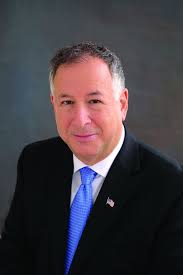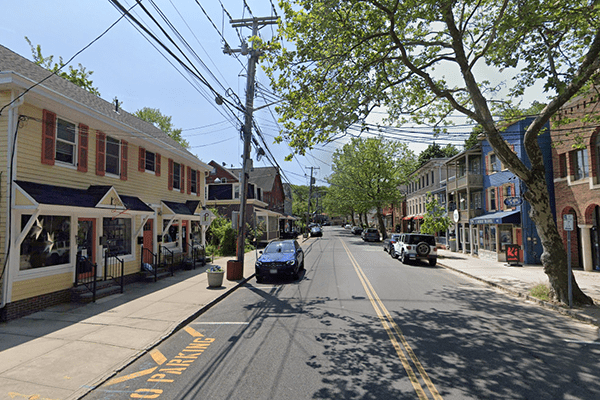|
RCBJ-Audible (Listen For Free)
|
Proposed Development Has Cost Village Public Officials, Ongoing Litigation & A Social Media Campaign That Has Turned Personal and Ugly
By Tina Traster
Since 2018, Piermont’s Mayor Bruce Tucker has had a sweet ride – the 66-year-old retired textile factory owner has worked tirelessly as a full-time, but part-time paid, civil servant and in return has held onto his seat for what is now his fourth two-year term.
“The first design was not anywhere near ready to fit in with the village and the developer got the message,” the mayor said.
But the Village’s passage of a rezoning plan along Main Street last March that gives wider berth to a proposed 14-unit apartment complex’s land-use approval process is causing a “seven-year itch,” so to speak.
Are Village residents “breaking up” with Tucker, or is the daily drum of vitriolic criticism on Facebook limited to a small subset of neighbors who live close to the proposed development? Can this once-happy “marriage” be saved? Is it even in danger?

For now, the answers to these questions remain unclear. But for the first time in his tenure, Tucker finds himself amid a barrage of controversy in a negative social media campaign that has cost the Village its Planning Board Chairman and a Board Trustee, and has tied up the Village in litigation over its zoning amendment. Debate over whether the “Central CBM (Central Business Multi-Use) zoning district was a sound policy decision has metastasized into an indictment on just about every decision the village has made or is making, whether it relates to issuing filming permits, an oil spill, finances.
“I had no sense that this was going to be so controversial,” said Tucker, referring to the CBM Zoning, which was promulgated to allow greater density and to bring the entire historic downtown district into zoning compliance. The mayor said the proposed downtown development would add tax rateables, get rid of an unsightly dirt patch that’s been used as an ad hoc parking lot for years, and provide housing aimed at millennials and empty nesters to the village.
What has shocked the mayor most about navigating his first significant controversy has been relentless ad hominem attacks on a Facebook page called “Preserve Piermont,” accusing him of enriching himself or enacting laws in secret, particularly when proposals and adoption of the zone change were noticed and voted on in public hearings.
“Listen, I can take criticism,” said Tucker, who has lived and raised a family in the village for 34 years. “But the worst of it is the vitriol on Facebook. If people disagree, I’m more than willing to discuss it. But to start accusing us of unsubstantiated inappropriateness, of kickbacks, of being paid off by developers, of not holding public hearings, making personal attacks – this is just dishonest.”
Preserve Piermont Facebook was founded in March; it has more than 600 members.
Piermont, a picturesque village on the Hudson River with a population of 2,500 residents, has long been a peaceful but pricy enclave that avoided the media’s glare. Mostly, the once working-class village that began gentrifying three decades ago, is comparatively expensive and exclusive compared to much of Rockland County. Notably, its downtown district rarely has vacancy signs; the village is a magnet for area residents and day trippers in search of awesome Hudson River access, coastal beauty, a dining scene, shops, galleries, and a touch of history. The Victorian village played a major role during World War II when more than a million troops marched from Camp Shanks to board vessels destined for Europe, earning the nickname “Last Stop USA”.
For his part, Tucker is proud of his record. In citing his accomplishments, he lists closing the Piermont Pier Park to motorized vehicles on Sundays from May 1 to Sept. 30, creating Gair Memorial Park, formation of a traffic committee, passing a “Do Not Knock” law, and securing grants for raising and repaving flood-prone Ferry Road. The Mayor’s administration has also taken a lead on becoming an environmentally-forward community, created a plastic bag-free policy via a Reusable Bag Law, banned Glyphosate (an herbicide) on village-owned property, converted street lighting to LEDs, tightened up an AirBnB law to prevent “ghost blocks”, created a rental registry, and has taken steps to protect the seawall and completed $100,000 in storm drainage improvements on the Erie Trail.
The village also approved a marijuana dispensary in the commercial district along Route 9W to “bring revenue to the village to offset rising costs and taxes.”
Part of Tucker’s Piermont “honeymoon” with village residents is owed to the board’s feat of 1 to 2 percent annual tax increases for six consecutive years. This year, however, Piermont jolted residents with a 6.9 percent tax increase because “everything hit at once,” the mayor said. “We’re dealing with sticker shock on insurances, inflation, huge retirement mandates by New York State.”
And while the village’s May 31, 2023 year-end fund balance is more than $3.2 million – three times what it was when Tucker took office — financial challenges lie ahead.
“When prices increase like this, there are only two ways to keep taxes down: either reduce services, which I don’t want to do, or increase rateables,” the Mayor said.
Therein lies the rub: Piermont has few vacant sites on which development can take place. It is land poor. There is one pending application for development at 675 Piermont Avenue along the riverfront, though that application has been stalled because the proposed restaurant project is too dense.
Apart from the gaping hole at 447-477 Piermont Avenue, there are no significant development opportunities. “We’re almost to the point of zero spaces,” said Tucker. “The fact that this is an apartment building means it’s taxed at a commercial rate.”
According to Tucker’s estimates, a 14-unit apartment complex on .4 acres on Piermont Avenue would generate roughly $112,000 annually in tax revenue, with between $100,000 and $200,000 in one-time permitting fees. In contrast, the mayor said a $2 million, 5,000 square-foot house on the site, for example, would generate about $15,000 in annual Village taxes.
Residents opposed to the apartment project made their opposition known at an April Planning Board meeting when Piermont Developers LLC showed a modern, boxy, brick-and-Hardie plank multi-family building more commonly seen in urbanized downtowns like White Plains.
Everyone – including Tucker – agrees the building’s aesthetics sorely missed the mark and would be incompatible with the village’s historical character. The developer agreed and understood it needed to go back to the drawing board.
Two weeks later, four Piermont residents, who oppose the proposal, filed suit in Rockland County Supreme Court seeking to void the village’s new zoning law and to stop the developer’s application before any approvals or permits are issued. Residents Janice Young, Laura Healy-Grznar, John Grznar, and Valentina Zitt, live within 500 feet of the project site at 447-477 Piermont Avenue where Piermont Developers LLC, also named as a defendant in the suit, seeks a Special Permit to build a 14-unit, three-story multifamily residential building.
Zitt and Young are the moderators of the Preserve Piermont Facebook page that has become the village’s inadvertent “water cooler.”
One poster recently wrote as part of a Facebook post: “The overarching problem is that the page has 600+ followers and is currently a vacuum for complaining and tearing people down to achieve a goal.”
The requirement for a Special Permit is part of a new zoning law, passed in March of 2023, that created the CBM (Central Business Multi-Use) zone. Plaintiffs allege the new Zoning Law and the CBM zone are illegal and have asked the Court to declare the local law “null and void.” Plaintiffs also say the Village has violated the Open Meetings Law by not posting notices and meeting minutes as required by New York State law.
The legal dispute arose after the Rockland County Planning Department, in a series of letters, wrote the “local law that created the Central Business Multi-Use (CBM) District was not properly referred” to the County Planning Department and that it is “jurisdictionally defective”.
Zoning Amendments require review by the Rockland County Department of Planning under what is generally referred to as GML (General Municipal Law) Section 239 Review.
At issue is whether the county received the document in a timely manner. To help prove its case, Piermont said it sent a copy of the GML to Grandview on January 10, but the receiving stamp shows a March date after Piermont adopted the law.
The Village says it fully complied back in January of 2023 when it mailed the proposed text amendment to the County Planning Department. The county says the village did not comply and says the local law creating the new zone was “not properly referred.”
In late May, Rockland Supreme Court Justice Hal Greenwald halted, at least temporarily, the processing of an application pending before the Village of Piermont for a Special Permit to construct a multi-family dwelling unit at 447-477 Piermont Avenue in Piermont.
Greenwald in late May entered a temporary order granting the residents the relief they sought. The order derails the application, prevents the processing or granting of any approvals, and precludes the village from holding a public meeting unless and until it complies with New York’s Open Meetings Law by making the materials available related to the application available to the public. The Court was supposed to revisit the temporary order July 8th.
The parties are due in court on Aug. 21st.
Tucker does not understand why residents went to court, rather than await new architectural plans.
“The first design was not anywhere near ready to fit in with the village and the developer got the message,” the mayor said. “People don’t have any patience. The developer said he would redo the plans, but they couldn’t wait.”
The residents who filed the suit and others have made it clear on Facebook and through their community activism they believe a 14-unit apartment complex will invite additional “unwanted” development, as well as increased traffic along Main Street.
But the mayor is even more distressed about a letter to the court sent by the petitioners’ attorney Brian Condon that effectively questions whether the village clerk/treasurer has perjured herself.
“In 25 years of practicing law, I have never accused anyone of perjury,” Condon writes. “However, in light of the stamped document presented to this court showing that the mailing was not made to the Village of Grandview until March of 2023, I think (Jennifer) DeYorgi Maher must be questioned under oath.”
Tucker said he finds the accusations distressing.
“Jennifer is the most honest person I’ve ever met,” adding she is an EMT, alongside petitioners on the lawsuit. “There’s no honor with these people; they don’t even respect fellow volunteers. It’s unbelievable.”
Even more confounding to Tucker is the Judge’s decision to impose a temporary injunction.
“I thought the judge would by now have lifted the injunction,” said Tucker. “Condon keeps submitting letters after the cutoff date. Our attorneys have never seen anything like this.”
The village has hired outside counsel to handle the case, Desmond Lyons of Lyons McGovern LLP of White Plains.
“This is the first time in seven years the village has been named in a lawsuit,” said Tucker. “We’ve had meetings where people disagree but nothing like this has happened in a decade.”
Tucker, who worked in the private sector for nearly 30 years, said the village will get through this.
“I’ll get through this, the board will get through this,” said the mayor. “This has been very distressing. Not the fact that people are disagreeing but the personal attacks, the misguided tactics. Residents who are for development are also being attacked.”
He added: “If I thought this one building in downtown would change the whole character, I would never have been for it.”
Asked if he’ll run for re-election in 2025, the Mayor quipped: “Ask me in March,” adding “a lot can happen.”















